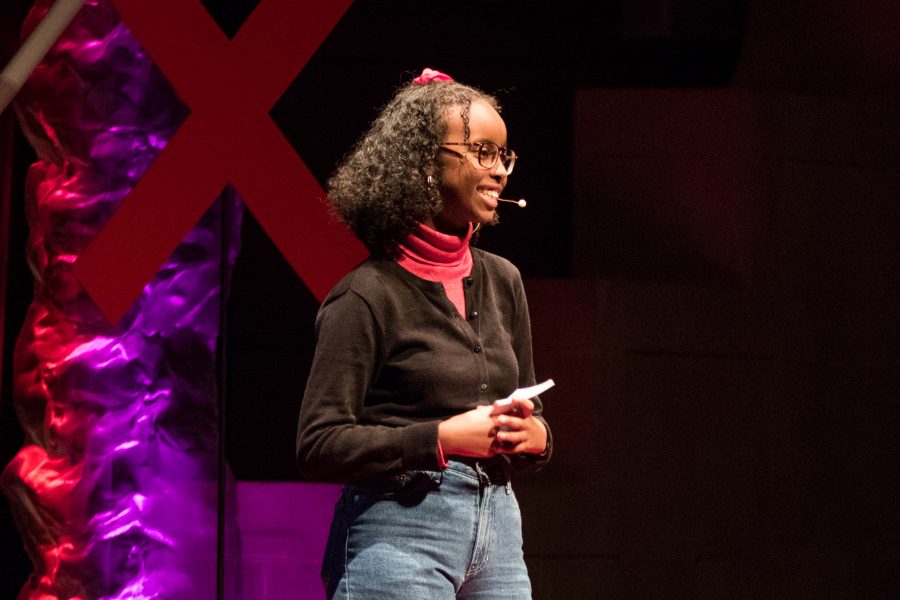Wait Chapel was bathed in red light in the days preceding TEDxWakeForestU: ReVision. The university’s ninth consecutive TEDx event was directed and curated by senior Livi Andreini. The conference included eight presentations delivered by speakers from a variety of fields and backgrounds, each with unique perspectives on the role of revision in our lives. The presentations sought to facilitate reflection, introspection and dialogue by posing challenging and engaging ideas.
“We intentionally picked a team which was cohesive and represented a wide array of interests and positions on campus,” Andreini said.
“We wanted to hear from as many perspectives as we could, because the team is really collaborative at every step,” Andreini said. “Our philosophy was that if our team, representative of such a wide group on this campus, was excited about what we were doing, that other people would be too.”
To begin the event, author and educator Katie Koestner discussed her experience of speaking out against date rape as a collegiate activist. Koestner focused on the challenges she faced by bringing date rape into public discourse, and emphasized the necessity of speaking up for oneself.
Following Koestner’s presentation, Nathan Atkinson, the director of business development for Village Juice Company and president of Help Our People Eat (H.O.P.E.) of Winston-Salem, discussed the role of for-profit organizations in embracing community service and charitable work. Whereas non-profit organizations frequently lack the resources and funding to effect change in a community, Atkinson explained that for-profit business can mobilize existing resources, networks and associations in order to leverage their role in the community. Through his work with Village Juice and H.O.P.E of Winston-Salem, Atkinson continues to address food insecurity through non-profit and for-profit means.
Next, Diya Abdo, an associate professor of English at Guilford College and founder of Every Campus a Refuge (ECAR), proposed revisions to the way in which university campuses are conceived in local and global contexts. Through her work with ECAR, Abdo has helped to host 45 refugees on the campus of Guilford College in Greensboro, and has since expanded the program to other universities, including Wake Forest. Abdo emphasized that college campuses are especially suited to serve as refugee shelters due to their communal nature, existing infrastructure and passionate citizenry.
Additionally, Sarah Dashew, a singer-songwriter with 20 years of experience in the music industry, discussed her experience of navigating expectations of success and the process of growing up. She described that, through introspective realization, she continually strives to regain the strength and courage associated with childhood. This theme became evident in her songwriting and prompted Dashew to write a children’s book.
After Dashew’s presentation, Khalil Rafati, a speaker, author and entrepreneur, discussed the process of coming to terms with his troubled childhood and of overcoming drug addiction in his later years. Rafati emphasized the notion that, by exercising control over individual actions and behaviors and by finding meaning in service to others, he was able to overcome difficult circumstances and achieve a more pleasurable life.
Lya Battle, the co-founder of Territorio de Zaguates, a Costa Rican animal shelter housing over 1,500 stray dogs, discussed the issues that the organization faced as it became increasingly successful. The shelter, which allows dogs to live on an expansive property, constitutes a revision of how animal shelters operate.
Then, Justus Harris, artist and founder of MedSculp, has reexamined how medical data is visualized. Harris creates tangible objects that represent patterns and trends in medical data in more intuitive ways. By combining healthcare, design and technology, Harris has worked to improve the experience of patients and medical professionals.
Isra Hirsi, a high-school student and co-founder of the US Youth Climate Strike, discussed her identity as a black Muslim woman and its relationship to her advocacy. She emphasized the necessity of creating spaces in which diversity is not only present, but empowered. Hirsi aims to underscore the intersectional nature of climate issues and activism.
Senior Jay Thompson found the presentations to be a stimulating opportunity for reflection.
“Overall, the TEDx was great,” Thompson said. “I do not spend too much time thinking about revisioning. Hearing Dashew telling her story of revisioning made me think of the complexities of revisioning and how we are always doing it.”
Following the presentations, Provost Rogan Kersh discussed the notable aspects of the university’s TEDx events.
That the event is entirely executed by students, said Kersh, makes TEDxWakeForestU a unique conference. Likewise, the ambiguity of the theme of revision allowed speakers to explore a variety of important topics.














